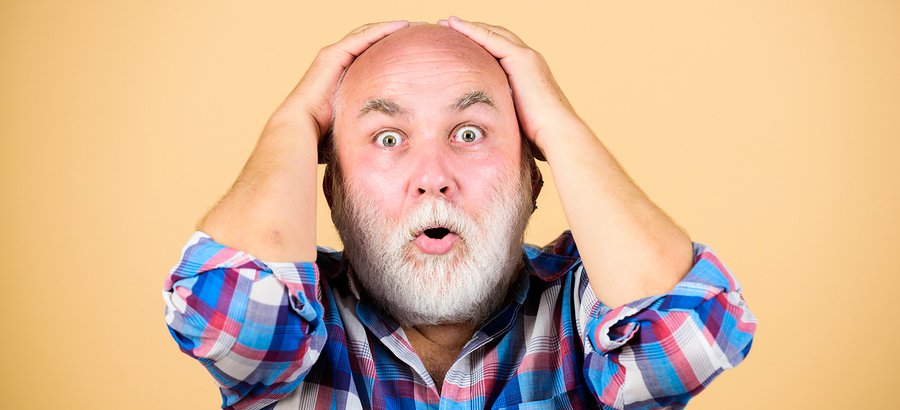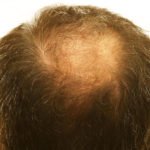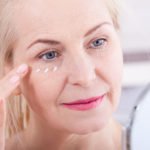How to Naturally Reduce Hair Loss
Hair thinning can be upsetting, for both men and women. But it’s important to remember your hair’s natural cycle. Due to the natural growth and shedding cycle of hair on your head, it’s common for people to lose around 100 hairs a day! And, it is a part of the aging process. By age 40, half of all men experience hair loss. For women, more than half will experience hair loss by the age of 70 due to hereditary conditions. That said, there is some good news. Outside of stress, medical conditions, radiation treatment, or harsh shampoos and styling practices, there are several things to keep in mind when going bald:
- Maintaining proper ratios of Omega-6 to Omega-3 fatty acids is important, as seen in a Mediterranean diet. The proper ratio helps control both systemic inflammation and insulin resistance, which can both play a role in hair loss. Also, a 2018 study revealed that a diet containing raw vegetables and fresh herbs may reduce the risk of androgenic alopecia. Best results were observed when participants consumed high amounts of parsley, basil, and salad greens more than three days a week.
- Preventing the conversion of testosterone to dihydrotestosterone is also key.
- Maintaining optimum levels of HGH is important.
- A study of young men diagnosed with male pattern baldness showed that the blood flow to their scalps was on average 2.6 times lower than in a control group. This is why devices that use electrical stimulation and infrared light have been helpful for some men.
- Excessive sebum (scalp oil) causes a high level of 5-alpha reductase, the enzyme which converts testosterone into dihydrotestosterone (DHT), and pore clogging, thus malnutrition of the hair root and a shift into the resting phase. Keeping the scalp clean with a good shampoo can help. One study showed that topical saw palmetto may block 5-alpha-reductase, limiting hair loss.
- Increase your Vitamin A intake to help with sebum production and rate of hair growth. Vitamins B, C, D, iron, selenium, and zinc are also important to the hair growth and retention processes, specifically with cell turnover.
- Although more research is needed, rubbing coconut oil in the scalp may prevent hair damage. The lauric acid found in coconut oil may help bind protein in the hair, protecting it from breakage at the root and strand.
- Scalp Massage. A small 2016 study showed that participants improved hair thickness with just four minutes of massage a day over a course of 24 weeks.
For women, there are several other factors that come into play.
- Overly tight braiding or repeated nervous pulling on hair can cause hair loss.
- Autoimmune conditions, more prevalent in women than men, can kill hair follicles leading to hair loss. Proteolytic enzymes, L-carnosine, and Cetyl-myristoleate can all help reverse this condition.
- Hormonal imbalance (estrogen dominance and loss of testosterone) and thyroid problems (often caused by hormonal imbalance) can also cause thinning of hair. Using progesterone creme and herbs such as nettles can help correct the situation.
Keep in mind that any treatment you use may take six months to a year to show hair loss improvement. Consider seeing a doctor if you are experiencing sudden or extreme hair loss. Some conditions, like thyroid issues, may not respond to home remedies and may require other treatment.












I HAD MY THRYOID REMOVED SO NOW I AM HYPOTHYROID. MY HAIR FELL OUT IN CLUMPS BUT NOW HAS STOPPED. IT ALSO GOES THROUGH PERIODS OF BEING SUPER CURLY(IT WAS STRAIGHT ALL MY LIFE ALTHOUGH MY MOTHER SAID IT WAS CURLY WHEN I WAS LITTLE) AND STRAIGHT. I WOULD APPRECIATE IT STAYING CURLY. HAS THIS HAPPENED TO ANYONE ELSE. I WAS WONDERING IF IT COULD BE ATTTRIBUTED TO A SUPPLEMENT I WAS TAKING. BUT I HAVE NO CLUE TO WHICH ONE WOULED DO THIS. ANYONE HAVE ANY CLUES AS TO WHAT IS GOING ON WITH MY HAIR? PLEASE? THANKS, CONNIE
This change occurs in some
This change occurs in some women who take chemotherapy. Hope you are on appropriate thyroid hormone replacement therapy including checking blood levels of TSH, Free T3, and Free T4 every few months until stabilized.